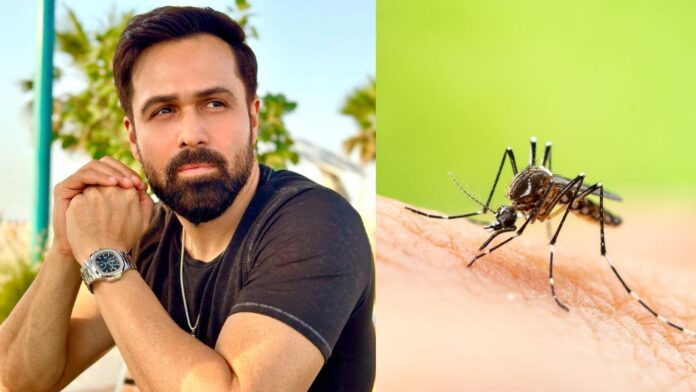Emraan Hashmi has been diagnosed with dengue. Since monsoon season is coming, know how to protect yourself from getting infected with this viral infection.
Actor Emraan Hashmi has been diagnosed with dengue, and has had to take a short break from shooting his upcoming film. He has been working on a pan-India film titled OG with actor Pawan Kalyan, which also marks Emraan Hashmi’s debut in Telugu cinema. However, while filming in Goregaon, Mumbai, Emraan Hashmi began feeling unwell and exhibited symptoms of dengue. After getting tested, the reports confirmed he had contracted the viral infection. Doctors have advised him to rest so he can recover quickly. As a result, Emraan Hashmi has paused the shoot and is on a break to recover soon.
What is dengue fever?
Dengue is a viral infection spread to humans through the bite of infected Aedes mosquitoes. It is commonly found in tropical and subtropical regions. In many cases, dengue causes mild illness or shows no symptoms at all. However, in some people, the infection can lead to severe complications and may even become life-threatening. According to the World Health Organization (WHO), around 100 to 400 million dengue infections occur globally each year.
Warning signs of dengue fever
Dengue fever usually starts with a sudden high fever and can cause a range of symptoms. Common warning signs include:
- Severe headache
- Pain behind the eyes
- Joint and muscle pain
- Skin rashes
- Nausea or vomiting
- Extreme tiredness
Due to the intense body aches, dengue is also known as “break-bone fever.” In some cases, dengue can become severe and lead to dengue hemorrhagic fever, which can be life-threatening, especially in children. That is why it is important to recognise the symptoms early and take steps to protect children from getting infected.
Second time dengue can be deadly
Getting infected for the second time with dengue can be more dangerous than the first. According to the World Health Organization (WHO), the risk of developing severe dengue increases with a second infection. A 2024 study published in the Journal of Microbiology, Immunology and Infection found that 7.8 percent of second-time dengue patients developed severe symptoms, compared to 3.8 percent of first-time patients.
Severe dengue often starts after the fever has gone. Warning signs include:
- Severe stomach pain
- Constant vomiting
- Rapid breathing
- Bleeding gums or nose
- Extreme tiredness
- Blood in vomit or stool
- Cold or pale skin
You may also feel restless and very thirsty. According to the US Centers for Disease Control and Prevention (CDC), these symptoms usually begin 24 to 48 hours after the fever ends. Even after recovery, many people continue to feel weak and tired for several weeks.
How to prevent dengue?
Dengue spreads through the bite of an infected mosquito, and these mosquitoes can bite during both day and night. Since there is currently no vaccine to prevent dengue, the best way to stay safe is to avoid mosquito bites. Here are some simple steps to protect yourself and your family:
- Use mosquito repellents on exposed skin
- Wear loose-fitting, long-sleeved shirts and pants
- Keep your home and surroundings clean
- Empty or cover containers that collect water (mosquitoes breed there)
- Sleep under a mosquito net, especially if there is no air conditioning
- Install screens on windows and doors to keep mosquitoes out
By following these preventive tips, you can reduce the risk of infection and help stop the spread of dengue.
Related FAQs
Is dengue fever contagious?
No, dengue fever is not contagious. It does not spread from person to person through touch, coughing, or sneezing. It spreads only through the bite of an infected Aedes mosquito. If a mosquito bites a person infected with dengue and then bites someone else, it can transmit the virus.
How to know if it is Covid-19 or dengue?
Both Covid-19 and dengue can cause fever, body aches, and fatigue, which makes it hard to tell the difference without a test. However, dengue often causes a high fever, skin rash, pain behind the eyes, and severe joint and muscle pain. Covid-19 symptoms usually include cough, sore throat, shortness of breath, and loss of taste or smell.
What is the difference between malaria and dengue?
Dengue is caused by a virus, while malaria is caused by a parasite. Dengue spreads through the bite of an infected Aedes mosquito, while malaria is transmitted by the Anopheles mosquito.
Do dengue cases rise in monsoon?
Yes, dengue cases usually rise during the monsoon season. This is because rainwater collects in open containers, puddles, and other places, creating ideal breeding grounds for mosquitoes. The warm and humid weather also supports mosquito activity.

